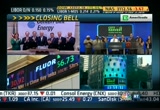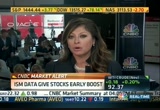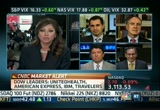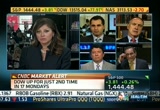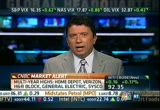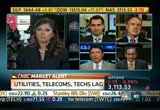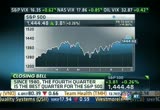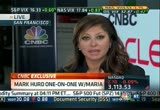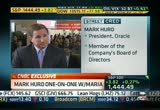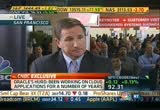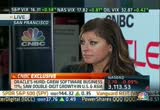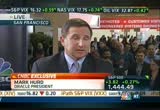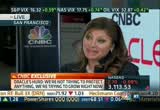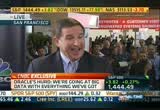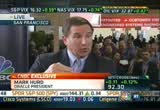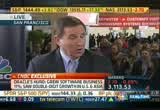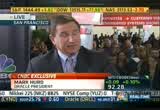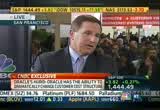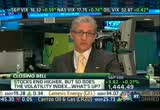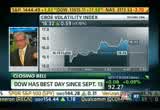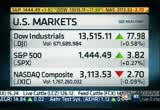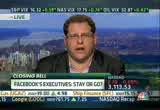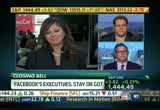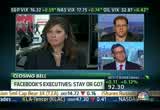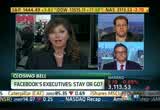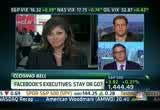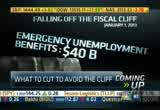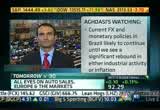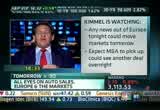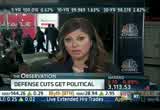tv Closing Bell With Maria Bartiromo CNBC October 1, 2012 4:00pm-5:00pm EDT
4:00 pm
good read on the economy with maria's exclusive interview there in san francisco with the president of oracle corp, mark hurd. i'll see you tomorrow. and it is 4:00 on wall street. do you know where your money is? hi, everybody, welcome back to "the closing bell." i'm maria bartiromo coming to you today from san francisco. we're following up the close this monday night. stocks losing steam in the final hours of trading today. dow industrials had a rip roaring day, thebest, up as many as 161 points. after stronger than expected manufacturing data set the tone this morning for this market. stocks gave back much of the gains after federal reserve chairman ben bernanke defended the central bank's latest bond buying stimulus program. is that a red flag that this fed-fueled rally is in trouble? top strategists are weigh in tonight. take a look at how we're finishing the day on wall street. as you can see, things settled out, dow jones industrial average held on to a
4:01 pm
double-digit move, although well off of that 161-point rally. the nasdaq went negative, although it, too, came back off of the worst levels finishing flat on the session. that had everything to do with apple. apple stock today down bringing the rest of the market down with it. it is in so many portfolios. s&p 500 up. it's the last day of the quarter of the year. we closed off the highs of the day. not a bad way to kick off the fourth quarter. is today's performance a good indicator of what's ahead? should investors be bracing for a rocky road going into year end? i bring in right now wells fargo adviser, chase investment council, peter, cnbc.com's jeff cox, our own rick santelli. good to see you all. thank you so much for joining us. what do you think? good day for the markets? but, of course, off of the best levels. what does this tell us about the fourth quarter? >> yeah, sure. you have a lot of positive momentum heading into the fourth quarter. the seasonals tend to be positive going into the end of the year and the beginning of
4:02 pm
the new year. you know, you've got that going for you but have some uncertainties. the u.s. elections, the fiscal cliff. you've got some back tracking in europe. and then you've got the leadership transition in china. so i think you're going to have that positive influence, maybe met with a little bit of resistance around some of the unserpt you'll see because of these i vents. we think the markets are higher 15 months from now. >> okay, so even if we do see this volatility you think 15 months from now, are you going to be in a better position? what about that, peter, we've been talking today that the expectations call for a contraction in third quarter earnings. going to see a negative performance from the third quarter, these are the expectations, anyway, to bounce back in the fourth quarter. the market -- really haven't changed very much. >> yes, maria. i think the market is ahead of itself. as the prior speaker said, there's a lot of uncertainty out there. markets have been very strong this year. so some giveback in the fourth quarter is not unexpected by me.
4:03 pm
i kind of welcome it, because we're stock pickers and that will give us a chance to find some attractive companies. >> where's the value right now in this market? >> you know, two of the areas we've been looking at and have bought some stocks in are the energy area and the industrials area recently. >> were you going to just jump in? sorry about that. >> yeah, i was going to ask -- peter was talking about looking for a pullback. i think a lot of people are looking for the pullback. that's the tough part. if everyone is looking for the pullback, it may not come or when we want it. it could be put off for quite a ways. >> that's a good point. what about that? you don't want to fight the fed, right? >> yeah, i guess not, but i think the market is kind of at least at a stalemate with the fed here. if you look back to when qe 3 was announced, we're just about even, maybe a little bit higher. i think that, to me, is a big warning sign that, you know, how
4:04 pm
long is it going to be? what point does the market become qe resistant? we're testing that thesis right now. i'm looking at some of the other factors. i'm looking at insider selling right now which is about 11 times higher than insider buying during september. so somebody out there is getting scared. i think that's a lot of the reasons we talk about often. finally, where's the growth? we had two significant things come out from economists today. goldman sachs, lowering their fourth quarter gdp estimates. and the perpetual bulls at deutsche bank cutting their global growth forecast down from 3.3% to 2.9%. that 3% is a very important level because most economists will tell you anything lower than 3% for global growth is tantamount to a recession. >> and of course we know rick santelli, that gdp just came out for this quarter. the last quarter, and it was revised downward. >> absolutely. so, you know, we can talk about, you know, how buybacks and all the money that corporations are able to get their hands on, that
4:05 pm
many smaller businesses or main streeters can't, and, of course, you know, that does push the prices of stock ultimately higher. once again, the fed's picking and choosing on how capital's alloca allocated. you know, the futures market are telling us a different story this first trading day of the quart. er. s&p futures, they have an outside day. they're low, which was established before our time zone, was in 1,427. higher high, lower low than the previous day's session. that may mean trend reversal. >> that's a great point. >> something to pay attention to. >> great point by rick. i got a big kick out of fed president evans this morning explaining how qe works. basically we're going to buy mortgages, going to drive down interest rates, going to give people more disposable income and go out and spend stuff and give us good inflation. we're going to celebrate our good inflation, we're gassing our car up with $7 a gallon gas and $10 a pound ground beef and that will be just swell. >> good inflation. as opposed to bad inflation. thanks, everybody.
4:06 pm
we appreciate it. we'll see you soon. >> thanks, maria. >> stocks higher to kick off the fourth quarter today. which stocks are the best fourth quarter winners and losers? let's check with courtney reagan. >> if history holds, investors are in for a bullish quarter though some traders do think of october as a jinx month because of the crash of 1929, 1987 and the meltdown in 2008. since 1980, the fourth quarter is the best quarter for the s&p 500 posting a gain 81% of the time. consumer staples did win the trade today. over the last 20 years, technology has been the best performing s&p sector in the fourth quarter, up more than 7% on average. that makes sense since qe 4 is about that important holiday season. energy and utilities are the two most underperforming sectors in q4 over the past 20 years. so with the recent run-up in the market, are there still opportunities in the strong
4:07 pm
performing tech and consumer discretionary groups? one of our cnbc masters found tech trading at deep discounts in relation to historical averages. take a look at this. ebay's p/e average 50% its historical average below. intel, 47% below its historical average p/e ratio. 94% below its historical average. that's the best performer of the group followed by ad agency interpublic with a p/e ratio 62% its historical average. there could be room to run in some of these names. we'll have to wait and see until all of this plays out to come. maria, back to you. >> all right, court, thank you so much. we'll be watching that. courtney reagan. stick around. we have a lot more headed your way on this special monday edition of "the closing bell." coming up on "the closing bell" maria's one-on-one
4:08 pm
interview with oracle president mark hurd. what is it like to work with the company's colorful cea? and what is oracle's plan to boost sagging hardware sales? those answers are straight ahead. plus the face on facebook. leadership questions continue to dog the social media giant. can either mark zuckerberg or sheryl sandberg turn the company's sagging stock around? and peering over the cliff. at least one organization is proposing a less painful alternative to falling off the fiscal cliff. find out who they are and what they plan to do, straight ahead on "the closing bell." tdd#: 1-800-345-2550 after that, it's on to germany. tdd#: 1-800-345-2550 then tonight, i'm trading 9500 miles away in japan. tdd#: 1-800-345-2550 with the new global account from schwab, tdd#: 1-800-345-2550 i hunt down opportunities around the world tdd#: 1-800-345-2550 as if i'm right there. tdd#: 1-800-345-2550 and i'm in total control because i can trade tdd#: 1-800-345-2550 directly online in 12 markets in their local currencies. tdd#: 1-800-345-2550 i use their global research to get an edge. tdd#: 1-800-345-2550 their equity ratings show me how schwab
4:09 pm
tdd#: 1-800-345-2550 rates specific foreign stocks tdd#: 1-800-345-2550 based on things like fundamentals, momentum and risk. tdd#: 1-800-345-2550 and i also have access to independent tdd#: 1-800-345-2550 firms like ned davis research tdd#: 1-800-345-2550 and economist intelligence unit. tdd#: 1-800-345-2550 plus, i can talk to their global specialists 24/7. tdd#: 1-800-345-2550 and trade in my global account commission-free tdd#: 1-800-345-2550 through march 2013. tdd#: 1-800-345-2550 best part... no jet lag. tdd#: 1-800-345-2550 call 1-877-561-5445 tdd#: 1-800-345-2550 and a global specialist tdd#: 1-800-345-2550 will help you get started today.
4:10 pm
extra curricular activities help provide a sense of identity and a path to success. joining the soccer team. getting help with math. going to prom. i want to learn to swim. it's hard to feel normal, when you can't do the normal things. to help, sleep train is collecting donations for the extra activities that, for most kids, are a normal part of growing up. not everyone can be a foster parent... but anyone can help a foster child.
4:11 pm
welcome back to our special coverage today from oracle's open world here in san francisco. we are here, 50,000 of our closest friends are with us as well. whether it's storage expense, social media, software application and even cloud computing, oracle wants to be the one-stop shop that will address it all. the company faces competition now from some established players and upstarts. what is the plan of attack? i'm happy to welcome to the program, right now, on a cnbc exclusive, oracle's president mark hurd. mark, good to have you on the program. >> thanks, maria, thanks for coming. >> thank you for having us. this open world conference, has
4:12 pm
been quite exciting. is it fair to say this is a repositioning for the cloud for oracle? >> we announced the cloud in june. we've been working really on cloud applications, the company has for multiple years. we made exciting announcements last night in the context of being able to do things with the cloud, both of what you think of as the oracle cloud but also private clouds for customers right now. pretty exciting. i wouldn't call it repositioning. i would call it continuation of a lot of work the company has been doing for a long thyme to get ready tfor this. >> is that where the growth comes from going forward for or call? first, let me get your take on what's going on. the last quarterly results we reported, a week and a half or so, suggest things are slowing. how would you characterize business today? >> we reported about ten days ago. we grew our software business at about 11%. we had double-digit growth in asia, double-digit growth in latin america, double-digit growth in the u.s. good growth in europe really
4:13 pm
outside public sectors. so looked good for us. we reported on our conference call. we saw significant growth in our pipeline which is obviously a good indicator. if you looked at what consensus estimates were for software for q2, we raised those estimates a bit for our coming q2. so some of that, marimaria, may oracle specific. we feel good about our product line. we expanded our distribution over the course of the past 18 months. so it may not be a read on the entire economy, but we feel good about our position. >> much of the analysts and holders of the stock out there, of course the stock has been a great performer. 25% year to date. you're in the leadership position, no doubt about it. when you strip out acquisitions, a lot of people looking at your earnings saying, yeah, when you see the licensed growth of 11%, strip out the acquisitions actually and it's more like 2%. are things as vibrant as they have been? or are you seeing some slowdown in some parts of the business? >> we felt great about our growth in q1. it's what we said we were a
4:14 pm
little bit better than we expected. as i mentioned, we raised for q2. so, again, i think we're doing well. we're gaining share in virtually all of our segments. you know, i'm gun shy to give you a message that says that's a good read-through, though, on the entire economy. >> what can you tell us about i.t. budgets today? we're covering every day what's going on in europe. you know, what's going on in asia. china is slowing quite dramatically. 50% of the business coming from outside the united states. what can you tell us about spending money, managers putting money to work in terms of i.t.? >> people will spend money if there's good return on investment, solid return on investment, people will spend. i think that's indicative of what you saw in our results. that said, there isn't a customer went do have, maria, who isn't on an austerity plan and innovation agenda at the same time. people are trying to save money. at the same time, to free them up to be able to invest. >> let me get your take on this transition or sort of the way data has transitioned. you know, traditional data,
4:15 pm
oracle has been the main company and the leadership firm there. but data is changing. and so now people are calling it big data, whether you're talking about traditional data or the data from cell phones, smartphones, biotech, a lot of health care information. what are you doing in terms of transitioning to the big data? because it does seem some of the smaller upstarts have taken some market share in some of that big data, the data that's changing. >> big data, most often described as more data. we view that as great. >> but you have the products to keep up with that. >> you've seen us make several acquisitions where we've integrated social media capabilities into our applications. what's important for us is to allow our customers to be able to take advantage of what are very atomic levels of datdata. for example, a customer we have that's got a brand that releases a product, we can integrate social media data to tell them how people are reacting to that brand, how people are getting realtime feeds about what's
4:16 pm
happening with their product, with an event that they're describing. and we can integrate that social data, if you will, big data, into our core applications. this is a tremendous opportunity for our customers and for us. >> and do you feel you've got the right product line to capture that? you know, some of these smaller upstarts, and there are a lot, you know, they're trying to make the case to your clients, a ge, for example, they're saying, look, yes, oracle can handle this traditional data, but you don't have to pay high maintenance fees. how are you going to protect that maintenance revenue that you're charging companies when you've got an upstart saying, come with us, for the social media part of your business? >> maria, we're not trying to protect anything. we're trying to grow. we're going at this with everything we've got. in terms of growing, new set of applications, we call them fusion cloud applications. you'll see demos tomorrow. larry will do a keynote in the afternoon where we'll integrate social data, if you will, big data into our core applications. we'll do the same thing on thursday.
4:17 pm
i'm going to do a keynote on big data. i'll give you a different example of sort of the same point, how we integrate unstructured data you mentioned, phone calls, pictures, objects of all times, integrate that with structured data to form an integrated view of data and turn that data into information you can use to sell more, cross sell, upsell, to do things you frankly were never able to do before and do it in realtime. >> do you need to resize anything in terms of the pricing? technology's getting cheaper. isn't that one of the big issues with technology? no matter what company you are. innovation has to be there, and unfortunately some things are commoditized. technology is getting cheaper, isn't it? >> maria, to the point, we have the ability, you're going to hear this around the conference the next day or so, to dramatically change the cost points that our customers have. most of our customers just to give you numbers, i know you like numbers, data is going to grow for most of our customers
4:18 pm
40%, 45%. they're spending, a technical term, 8,000 to 10,000 bucks a ter terrabite to store that data. storage is 10% of their total i.t. budget. if you run through those numbers, you're going to grow 2%, 3% your i.t. budget doing nothing more than chase the data. oracle, we have the ability to take that position and shrink their data, come press their data, give them more performance while they do it, save our customers a bunch of money, consolidatie ining that infrastructure, make it perform better. at the same times, companies you're going to hear around the conference, have tremendous opportunities to innovate with modern applications with fusion cloud applications. that's our agenda, help customers innovate and save money at the same time. >> what's a bigger priority to you? talk to us about the use of cash. you have a small dividend. relative to some of your competitors. microsoft, cisco, has been ramping up on the dividends. you've been buying back stock.
4:19 pm
then, of course,ing acquisition have been the lifeblood of the company. >> they've been clear in their messaging to the capital markets. we're going to have a balanced approach toward how we deploy our capital. we're going to be inquisitive where it makes sense. we have been. that's probably the best measure of our behavior, where we've seen things. typically over the past year we've bought leading companies, companies that had leadership positions. they had technological positions that have advanced our portfolio. we have consistently, well, you mentioned our dividend, increased our dividend and we've been active in share buybacks. we're active in our fiscal q1 share buyback because we thought the price of the stock was very low. and so we were aggressive in buybacks. i think this effort has been clear, we're going to have balanced approach toward the capital strategy. >> you thought your stock was very low. i'll tell you one thing, the market value loss within technology has been stunning when you look at the top of the list. right there at the top of the list is your old company, hewlett-packard.
4:20 pm
the value has dropped considerably since you've left. what's going on there? >> you know, maria, i would say i've been a lot more focused on the market exam increase of oracle than i have been in any changes of hp stock. i'll leave it at that. >> is hp still a competitor of oracle or have your competitors changed? >> well, you know, maria, i think, listen, first of all, historically the companies have had great complementary skills, they've been partners for years. i do think the market in technology evolves and there's terms we have in the industry call coopetition. and there are areas where many areas we partner with partner in one dimension and compete in another. frankly, in history, we're historically comfortable with that. we partner here. we know in some areas we're going to compete. you'll continue to see that evolve. take salesforce.com. runs on oracle base, middleware,
4:21 pm
but sales acquisition perspective, we're competitive. >> he said larry ellison is his mentor. that's a big competitor of yours. a move you made recently, you decided and announced you will no longer break out database revenue. so that's an application in the technology business segment. you're instead going to have a single license and cloud description metric. all the analysts are disappoint ed. they say this is less information. when a company says we're going to give you less information, it's a watershed moment. doesn't this obscure what's going on in the business? >> i know they'd love to have a conference call every friday. i could go through our pipeline, our customers, our deals. in the end, the markets are blending. what's sass, a private cloud, what's on premise, what's a license fee, what's renewable. you know, annuity from revenue perspective is all blurring. the fact of breaking this up, the question is how meaningful
4:22 pm
it is with respect to we're going to report total software revenue. we think that's an appropriate way to report the business. i understand the reaction you're describing but we think this makes sense. >> and you think you're going to be able to still give analysts and the investment community enough information about where the business is going? where does the growth come from next three years at oracle? >> well, first we have an analyst meeting thursday where we're excited to just tell them a lot about the business. we've had so many great things going on. i don't think i would pigeon hole the growth into one area. the cloud has tremendous growth for us. the cloud in a broad base, infrastructure is a service, platform is a service, applications is a service. tremendous opportunities there. we have this thing called engineered systems. the ability to take servers, storage, our database, integrate, consolidate, save our customers money. we doubled our business in engineered systems when we reported in quarter one. we had tripled it the year before. this is a tremendous growth engine for the company. complemented by what we do with clouds. we've made tremendous investments to industry groups.
4:23 pm
all of these are segments we feel that there's material growth so we're investing into it. >> software as a service is a big theme, as you've been mentioning. so real quick, an appropriate growth rate for oracle is what in the coming -- >> i'm out of the prognostication business. we're going to -- i can tell you this. whatever the market performs, we're going to for form better than the market. we're in a position, maria, we're going to spend $5 billion in rnd this year. spent $4.5 billion the year before. to your point, we've made very specific precise acquisitions to complement that portfolio. we've grown our sales force materially. over the past couple of years to enhance our distribution. i can't tell you how good we feel about the position of the company. our job, frankly, maria, i won't give you a growth rate just to go out and execute. >> good to have you on the program. we appreciate it. mark hurd, president at oracle. up next, the hoodie turns into a suit? facebook's mark zuckerberg courting russian leaders in formal business attire today. the nagging issue facing
4:24 pm
facebook investors, of course. the man in the suit and the coo sheryl sandberg should go. stick around. our facebook leadership debate coming up next. also ahead, he's been a doubter of the recent market rally, but is bob pisani ready to believe? pisani's take next. don't miss it. [ male announcer ] for the saver, and a big first step.
4:25 pm
4:26 pm
looking for a better place to put your cash? here's one you may not have thought of -- fidelity. now you don't have to go to a bank to get the things you want from a bank, like no-fee atms, all over the world. free checkwriting and mobile deposits. now depositing a check is as easy as taking a picture. free online bill payments. a highly acclaimed credit card with 2% cash back into your fidelity account. open a fidelity cash management account today and discover another reason serious investors are choosing fidel welcome back. from great britain to france, countries around europe are
4:27 pm
introducing new taxes on wealthy citizens. germany could be next. thousands of people across germany turning out in force this weekend. pushing for new taxes on wealth and financial transactions. demonstrators demanding a fair redistribution of wealth to combat a widening income gap. despite those protests in germany, european markets were higher today. but markets here in the u.s., well, they couldn't hold on to the bigger gains. although 70 points, bob pisani, not a bad return for day one of the forth quarter. >> yeah, i thought it was okay. the reason for the rally, folks, the new orders component of the ism, first data we get on september, was better than expected in growth territory. i thought that was good, modest rally. we were up much, much more earlier on. take a look at the dow jones industrial average. mr. bernanke came on, gave an interesting press conference, didn't say anything new bullet sort of sold into him as he came on and never really regained the earlier leads we had in the day. a couple of on observations, mar maria.
4:28 pm
the major sectors, the dow was up but well off the highs by the close. the transports never really participated. another lagging day for the transports versus the industrials. that's very noticeable. the nasdaq was negative for a good part of day. did end in negative territory. two other quick observations, marie ya. the vix went positive. about 12:30 when the dow was up 120 points. huh? what's that about? that's rare to see that happen. some options i talked to said the options guys are pricing it in. strange for the vix to be up on a day the dow is up. utilities, telecom, these are the guys, people loved these just a couple months ago. i think there might be some competition out there for the money, maria, but people are concerned about the economy. maybe a little bit more money into treasuries. we did see some of the treasuries up today. >> all right, bob, thank you so much. the market certainly more of a mixed story today. as opposed to such a good rally that we saw at the, in the early
4:29 pm
hours. up next, too little, too late? >> we're thinking about premium services for businesses. >> facebook chief operating officer sheryl sandberg in an interview you'll see only on this network. that is coming up next. we'll also talk about whether it's time for her and zuckerberg should heed critics? not everybody in washington has been on vacation. hear who came up with a solution to the nation's debt problem and whether the latest fix is doable. wait until you hear what's on the proposed chopping block. we're back in a moment on "the closing bell." so, i'm happy. sales go up... i'm happy. it went out today... i'm happy. what if she's not home? (together) she won't be happy. use ups! she can get a text alert, reroute... even reschedule her package. it's ups my choice. are you happy? i'm happy. i'm happy. i'm happy. i'm happy. i'm happy. happy. happy. happy. happy.
4:30 pm
(together) happy. i love logistics. if we want to improve our schools... ...what should we invest in? maybe new buildings? what about updated equipment? they can help, but recent research shows... ...nothing transforms schools like investing in advanced teacher education. let's build a strong foundation. let's invest in our teachers so they can inspire our students. let's solve this.
4:32 pm
welcome back. as you know, facebook's top executives have been staying out of spotlight since the company's ipo debacle earlier this year. chief operating officer sheryl sandberg just spoke exclusively to our own julia boorstin at the company's future. julia joins me with the highlights from the facebook headquarters in new york. julia, over to you. >> marimaria, sheryl sandberg s
4:33 pm
facebook has changed since its ipo, showing investors this is a company to bid on for the long haul, trying to find revenue from more different places on facebook. priority number one is building facebook's advertising revenue to turn around decelerating growth. >> already in the last couple months you've seen us roll out products pretty aggressively. we rolled out facebook exchange, custom audiences, new mobile ad formats, revamped our offers. all of these do one thing, which is they help make ads more targeted, more useful, and more effective for marketers on facebook. >> reporter: and it's not just advertising, sandberg tells me the company's looking at new potential businesses, like social search and e-commerce on the heels of last week's big announcement of a test of facebook gifts. and she revealed an entirely new area for growth, charging brands for analytics and customer service. >> as we increase our investment in monetization, we're thinking
4:34 pm
of premium services for businesses. we heard from businesses all over the world they want more from us. there are things they'd pay for they want us to provide. it's an area we're starring to explore. we don't have a product announcement for you today but it's something we're working on. >> reporter: advertising will continue to be facebook's core business, sandberg hopes diversifying into new areas can really show wall street that facebook will capitalize on its nearly 1 billion users. maria, you'll be able to find more from my interview with sandberg on mediamoney.cnbc.com. back over to you. >> great stuff, julia. thanks so much. julia boorstin. facebook ceo mark zuckerberg got dressed up to meet russian prime minister dmitry medvedev to boost the social media in russia. will the moves by zuckerberg and sandberg be enough to satisfy the critics who say facebook needs more seasoned leadership at the helm? nicholas carlson, a business insider, says both of them need
4:35 pm
to stay. good to see you guys. thanks for joining us. max, you say what facebook needs is a more structured team. why? why would you take out the founder of the term and have the leadership with someone who's sort of coming in from the outside? don't founders approach businesses a little differently than a hired hand? >> great to be with you, marie yea. they do. i wouldn't want to see this guy take a one-way trip around the barn. this person becomes a chief vision officer, chief innovation officer to allow him to do what he can do for the company as a goodwill ambassador. i think the clip you showed, taking him away from the ceo position, which seems to be as ill fitting as the suit, and put him in a place where he does something good, he watches over his baby as it were, and help it mature into an adolescent and adult to a $50 billion-plus enterprise that needs to do something to the big change they want to see. the company is capable of but hasn't delivered since the first
4:36 pm
rough day of trading back in may. >> that's interesting. that's what google did, bringing in eric smith and sergei took it back after a while. nicholas, you argue face bbook needs to keep both of them. >> zuckerberg built the company that has a billion users. what is facebook's biggest challenge now? mobile. everyone going from desktop to mobile. what did zuckerberg do in the spring? take 1% of the company's market cap, bought instagram, bigger than twitter, went from 7,000 daily active users to 11 million. the guy knows how to make strategic decisions. i don't see why you take him out. you can't take him away. the guy owns 50% of the company. he's always going to be running it because he's the owner. >> that's a good point actually. what did you think about that interview, guys, in terms of sheryl sandberg's attitude and the way she answered questions? it's the first time we're hearing from this company since the botched up ipo. you know, recognize that she did say that they're focused much
4:37 pm
more on monetizing, advertising, win was the big issue, right? >> absolutely. if you look at the tech space, the landscape is littered with the bodies of companies that weren't sure what they did. you have to execute on what you do, be dominant in it then you branch out. why i think zuckerberg should stay and he has the share power to stay. it isn't always a sweet spot with investors. if you don't believe me, look at zynga. >> sandberg built a business to $5 billion in terms of revenue. it's a $50 billion company. she came on in 2008, took over by what all accounts was a frat house and made it a real corporati corporation. it's still a $50 billion company. if you fire sheryl sandberg, guess what happens? you have to fire the entire senior executive team. look at what's going on at yahoo!. if you do this, facebook's biggest problem is deceleration of revenues. if you fire sheryl sandberg, you're looking at another year or two years of them trying to figure out what they do next.
4:38 pm
a turnaround plan. no, right now, sheryl sandberg is rolling out tuns of great products. they look interesting. they're not going to show up yet. we have to give them another quarter or two to show they can reaccelerate the revenues before we can it. >> i'm not looking at -- >> i'm glad you said that that it was a $50 billion company. you're right, it was a $100 billion. facebook is unfortunately, has a distinction in technology right now. having been the biggest loser in terms of market value in 2012 followed by intel then hewlett-packard, the three biggest losers in terms of market value this year. can they get it back? can facebook go back to where that stock traded after the ipo? $22, i believe. >> we think it will be a long, slow build. we think sandberg is there to stay. she should be there to stay. she's a real asset to the firm. the question isn't really the people, it's the process. you need a process that dominates social that doesn't believe it can dominate mobile except for the social part of
4:39 pm
mobile. that doesn't get into competition with companies like apple and google and amazon. without having the means or the wherewithal to win those competitions. that stays in its silo, outperforms everyone else, winds from there. that's what we've seen in every company that's made it to dominance. it's vertical. we've seen the sort of 12 tries to make advertisers happy with erosion of user experience. lead to a lot of tears and lead to negative performance. the company can turn around, but it has to do something different. because to expect the turnaround with the same things that turned you down is probably a bit of a long shot even if it's i comforting. >> max is right, i'm glad he agrees with me point that senior manager shouldn't go. they are trying different things. facebook is hosting cnbc at its new york headquarters. it's amazing. they're really trying to communicate. >> i'll leave it there, gentlemen. thank you so much. nick, max, see you soon. thanks so much. don't miss an nbc "today" show
4:40 pm
exclusive tomorrow with nbc's fa facebook's mark zuckerberg on thursday's nbc "today" show. our trio of wall street's tough strategists will be up next on what could move your money right from the get-go tomorrow morning. don't miss it. back in a moment with more "closing bell." up next, making the tough choices. talk about the latest plan being bounced around washington on what needs to be cut to avoid going over the fiscal cliff. stick around. some of the proposed cuts are shockers. [ male announcer ] the markets keep moving. make sure the news keeps coming with thinkorswim by td ameritrade. use the news links breaking stories with possible breakout stocks, options with potential opportunity, futures and forex with in-depth analysis. it's an all-you-can-eat buffet for all things trading.
4:41 pm
4:42 pm
you. we know you. we know you're not always on top of it. and how could you be? that often you just want... quiet. we know all that life demands from you. and how it's almost impossible for you to escape. almost. introducing a car made better for you in every way. the luxurious, all-new honda accord. it starts with you.
4:43 pm
welcome back. could the u.s. avoid the fiscal cliff and do it with less pain? taxpayers for common sense has a plan on the table they promise does just that. this group has outlined $2 trillion in budget cuts over ten years. that's $800 billion more than what will be cut if congress does nothing. by december 31st, automatic spending and budget cuts are enacted. how is that possible? where would the cuts come from? let's talk about it. joining me now from washington with the breakdown, ryan alexander, president of taxpayers for common sense. ryan, nice to have you on the program. thanks very much for joining us. >> thanks for having me. >> so for so long all we talk about is the low-hanging fruit that is defense cuts as well as the entitlements. medicare, medicaid, and social security. where do you see opportunity for cuts? >> we see opportunity across the budget. in agriculture, in transportation. as you say, in defense and in
4:44 pm
general government programs but across the government we think there's opportunities. probably if you look at crop insurance or commodity payments in the agriculture, that can add up. smaller areas that's $1 billion. $1 billion here, $1 billion there, it adds up to money. we wanted a menu of thoughtful choices to reduce our deficit and avoid sequestration. >> go through it for us. because, you know, i guess if it were that easy, it would have been a lot simpler getting to the point where we're at. can you talk to us specifics about what you think should be cut? >> sure. that's what we wanted to do in this report. it's more than $100 billion in agriculture, more than $100 billion in energy, and as i said, in agriculture, commodity crop payments, reforming crop insurance. in energy, we'd like to eliminate the entire tight. 17 loan guarantee program which includes the loan guarantee, you know, the program that brought you solyndra. we'd like to eliminate subsidies that have gone to the oldest and
4:45 pm
most profitable energy sectors, from the intangible drilling costs to the allowance for last in, first out accounting which actually affects more than the energy sector, but it's just a boondoggle for taxpayers in the u.s. it's not something that's allowed by international accounting stanstandards. in the defense sector, there's a real opportunity for savings by reducing service contracts. they're at record high levels. you know, like any other business tightening its belt, reduce our cost for outside vendors. some of these things can be, "a" done more efficiently with oversight and fewer cost overruns but always just done more cheaply. >> why do you think this isn't being done now? >> everything we have in our report is actually a low-hanging fruit substantively, but politically we have no illusions that these are all easy. everybody's got their constituency they're going to support. so these are things -- we need leadership. we need people to say this is the right thing. evidence doesn't support continuing to spend money on the osprey which has a 6% effective
4:46 pm
rate in combat. we can't have our troops using equipment that doesn't work. let's stop paying for it. we can't give money to industries that are incredibly profitable. so let's stop just giving money to people who have land that used to be farmed. let's stop the programs we can no longer afford and don't pack a policy punch that we need them to. >> yeah, i mean, all of this is very important and very good ideas. we notice that your proposal doesn't address the two biggest entitlement programs. social security and medicare. can you really get to those savings without sort of hitting the juggernauts? >> you know, we're not done working but at this point i think, you know, what we wanted to do was provide something the lame duck congress could look at and start thinking seriously about how to avoid sequestration. absolutely we need to do very thoughtful reform of medicare and social security and we'll keep working on that. but, you know, looking at discretionary budget, looking at taxing at our tax policy, there's a lot that can be done right now and we want to provide some of those options. >> some people say the results of sequestration, it's actually
4:47 pm
not a bad thing. because it will sort of focus our priorities, getting the country's debt and deficit under control. what do you think about that? >> well, sequestration cuts the good along with the bad. not everything government does is wasteful. not everything government does is good. go after the wasteful first, go after the policies which we know don't achieve the goals they were set out to meet. we don't think sequestration -- sequestration was set up as a threat, such a horrible threat that it would force congress to act and hasn't forced congress to act yet. we hope it will in the lame duck, that they'll take thoughtful steps by going after wasteful programs first. >> you're right. it hasn't gotten them to act yet. ryan, good to talk to you. thanks so much. >> thanks so much for having us. >> see you soon. "fast money" begins at the top of the hour. our traders give you the top picks for the fourth quarter. then we'll have all the headlines coming from the value
4:48 pm
investing congress. our traders will give you the trade. we'll also have the founder of 13 d monitor tell you how you could invest alongside the activist. have you noticed the price action in microsoft lately? it has stalled out. it's coming up upon a make or break quarter, the forth quar r quarter. we'll tell you whether or not this is dead money for the rest of the year. that and more on "fast" at the top of the hour. >> melissa, we will be there. up next, politics as usual? my observation on the defense companies feeling the hate from the obama administration on the timing of potential job cuts. wait until you hear the details of what's happening now. up next, what will move your money first thing tomorrow morning? three of wall street's top money pros here tell you what they're watching, on the other side of this break. stay with us. ♪ [ man ] when i'm in my zone... every move i make is a statement... ♪
4:51 pm
4:52 pm
everybody. let's kick it off with you, what are you looking at tomorrow? 30 seconds on the clock. >> well, if you're watching emerging markets, look out for brazil industrial production tomorrow morning at 8:00 a.m. probably mark the 12th straight month of contracting ip, going back to last september. this probably is most importantly for growth but also let's keep in mind policies. in short, we think you're probably going to need a very strong rebound in industrial activity for brazil if it abandons the easy monetary policy or the currency war effort. >> all right. thank you so much. and kevin, you're up, 30 seconds on the clock. what do you want to look at when that opening bell sounds? >> well, the leader has been the u.s. consumer. you have to watch auto sales here in the united states. we're expecting a number of something like 14.4, 14.5 million units at an analyzed rate. we're also going to get data out of china in terms of services data. and i think ultimately the data
4:53 pm
that's going to really rule the day, however, is going to be the demand for automobiles here in the united states. keep an eye on that. and then wednesday, we have the debates. >> of course. and then the auto numbers we'll be looking at, as well. jordan, over to you with 30 seconds on the clock. >> well, the markets are still held hostage every day by what's going on in europe and debt talks. also what's going on in the middle east. but i think ultimately when you get to work here, there's a ton of money sitting in the cash and corporations. i'm looking for some m & a news and see what sectors start to move on. i think specifically, technology, health care, energy. you want to see whether or not gold stays below 1800. you also want to see that apple's getting a little heavy. can the nasdaq hang in there with apple looking a little heavy. got to focus on the cash flow, not the headlines. >> all right. we'll leave it there. 30 seconds. let me ask you, we've got a little extra time here. let me ask y'all, is a bad omen
4:54 pm
that the market lost so much of its momentum from the highs? so, at the best, the dow was up 161 points, obviously, certainly nowhere near that high with the gain of 70 points. do you think that indicates we will see selling at the opening tomorrow? what do you think? >> let me say i don't. i think what happened here, apple got heavy at the end of the day. it represents so much of a part of the index at this point. we didn't close negative, we lost a little bit of our steam. i think our markets are actually healthy. want to look at the advance decline line and the new lows, they look good. >> what do you think? any thoughts on that? >> with me? >> yeah. >> i think it comes down to the esf in a timely manner, and the conditionality that correlates that, i think we're in good shape. and if not, obviously we'll see new lows. >> all right. well, europe once again in the
4:55 pm
spotlight. gentlemen, thank you we'll see you later appreciate your time tonight. up next, fiscal cliff follies, my observation on what might be behind promises from the white house to get them to delay potential layoff notices. stick around. want to try to crack it? yeah, that's the way to do it! now we need a little bit more... a little bit more vanilla? this is great! [ male announcer ] at humana, we believe there's never been a better time to share your passions... because the results... are you having fun doing this? yeah. that's a very nice cake! [ male announcer ] well, you can't beat them. [ giggles ] ohh! you got something huh? whoa... [ male announcer ] humana understands the value of spending time together that's a lot of work getting that one in! let's go see the birdies. [ male announcer ] one on one, sharing what you know. let's do it grandpa. that's why humana agents will sit down with you, to listen and understand what's important to you. it's how we help you choose the right humana medicare plan for you. because when your medicare is taken care of,
4:56 pm
4:57 pm
so, we all set? i've got two tickets to paradise! pack your bags, we'll leave tonight. uhh, it's next month, actually... eddie continues singing: to tickets to... paradiiiiiise! no four. remember? whoooa whooaa whooo! you know ronny, folks who save hundreds of dollars by switching to geico sure are happy. and how happy are they jimmy? happier than eddie money running a travel agency. get happy. get geico. fifteen minutes could save you fifteen percent or more.
4:58 pm
and finally today, my observation on the pressure and manipulation coming out of the white house around the fiscal cliff and looming layoffs in the defense industry. get this, the industry has been nervously waiting for any bit of clarity on whether it will have to notify employees that their jobs are being cut due to the expiration of federal spending programs as part of sequestration. that's scheduled to hit at year's end. the companies must notify employees this month if their jobs will be cut by october or face penalties and fees if, in fact, their jobs are cut come january when all of those cuts kick in if congress and white house do not make a deal on the fiscal cliff. they have to tell according to the union contract, they have to tell employees. but this is, of course, very inconvenient and bad timing for the white house. the last thing the obama administration wants is to see
4:59 pm
mass layoffs announced a month before the election. so enter the manipulation. the labor department is asking defense company ceos to delay notifying employees, even though the law dictates that they must. and today lockheed martin says it won't issue layoff notices before the election as it had planned to do. . it said it receivered assurances from the white house that the money would not be cut in january. how is that possible? aren't the costs mandatory if we hit the fiscal cliff? well, yes, but the administration could prioritize based on any criteria it chooses. perhaps it will make sure funds go to ensure that thousands of lockheed employees in northern virginia, a key swing state won't lose their jobs. but contract in states like georgia or alabama, well, those assurances may not come. that's just my observation. before we go, that will do it for the "closing bell" today. the market, of course, higher at the close but off of the best levels of the afternoon. hope you'll follow me on twitter and
307 Views
IN COLLECTIONS
CNBC Television Archive
Television Archive  Television Archive News Search Service
Television Archive News Search Service 
Uploaded by TV Archive on

 Live Music Archive
Live Music Archive Librivox Free Audio
Librivox Free Audio Metropolitan Museum
Metropolitan Museum Cleveland Museum of Art
Cleveland Museum of Art Internet Arcade
Internet Arcade Console Living Room
Console Living Room Books to Borrow
Books to Borrow Open Library
Open Library TV News
TV News Understanding 9/11
Understanding 9/11